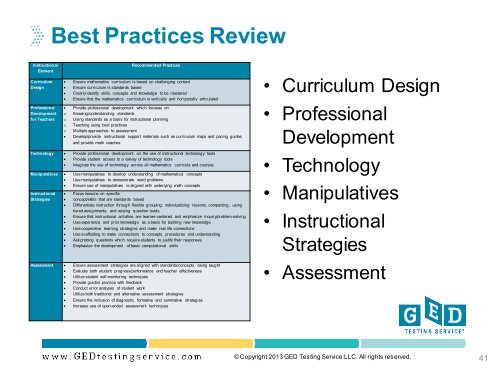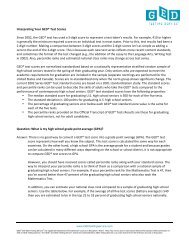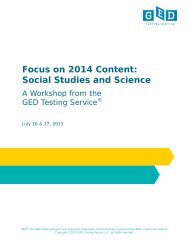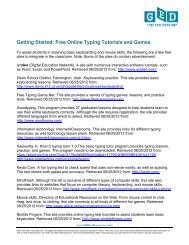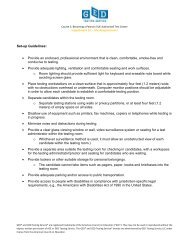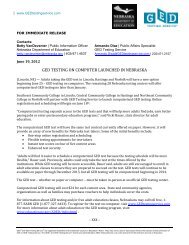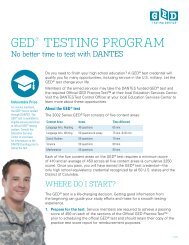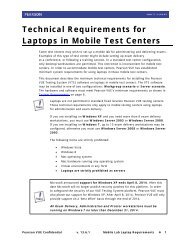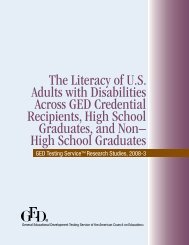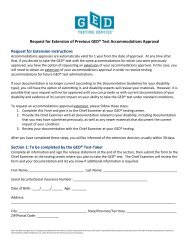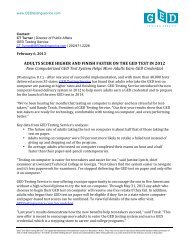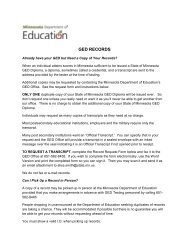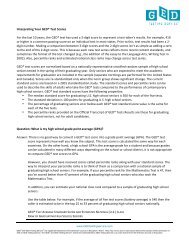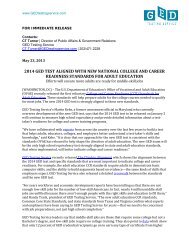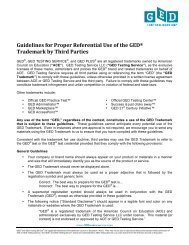Focus on 2014 Content: Math Mastery - GED Testing Service
Focus on 2014 Content: Math Mastery - GED Testing Service
Focus on 2014 Content: Math Mastery - GED Testing Service
Create successful ePaper yourself
Turn your PDF publications into a flip-book with our unique Google optimized e-Paper software.
Best Practices Review<br />
Instructi<strong>on</strong>al<br />
Element<br />
Curriculum<br />
Design<br />
Professi<strong>on</strong>al<br />
Development<br />
for Teachers<br />
Recommended Practices<br />
• Ensure mathematics curriculum is based <strong>on</strong> challenging c<strong>on</strong>tent<br />
• Ensure curriculum is standards based<br />
• Clearly identify skills, c<strong>on</strong>cepts and knowledge to be mastered<br />
• Ensure that the mathematics curriculum is vertically and horiz<strong>on</strong>tally articulated<br />
• Provide professi<strong>on</strong>al development which focuses <strong>on</strong>:<br />
o Knowing/understandi ng standards<br />
o Using standards as a basis for instructi<strong>on</strong>al planning<br />
o Teaching using best practices<br />
o Multiple approaches to assessment<br />
• Develop/provide instructi<strong>on</strong>al support materials such as curriculum maps and pacing guides<br />
and provide math coaches<br />
Technology • Provide professi<strong>on</strong>al development <strong>on</strong> the use of instructi<strong>on</strong>al technology tools<br />
• Provide student access to a variety of technology tools<br />
• Integrate the use of technology across all mathematics curricula and courses<br />
Manipulatives • Use manipulatives to develop understanding of mathematical c<strong>on</strong>cepts<br />
• Use manipulatives to dem<strong>on</strong>strate word problems<br />
• Ensure use of manipulatives is aligned with underlying math c<strong>on</strong>cepts<br />
Instructi<strong>on</strong>al<br />
Strategies<br />
• <str<strong>on</strong>g>Focus</str<strong>on</strong>g> less<strong>on</strong>s <strong>on</strong> specific<br />
• c<strong>on</strong>cept/skills that are standards based<br />
• Differentiate instructi<strong>on</strong> through flexible grouping, individualizing less<strong>on</strong>s, compacting, using<br />
tiered assignments, and varying questi<strong>on</strong> levels<br />
• Ensure that instructi<strong>on</strong>al activities are learner-centered and emphasize inquiry/problem-solvi ng<br />
• Use experience and prior knowledge as a basis for building new knowledge<br />
• Use cooperative learning strategies and make real life c<strong>on</strong>necti<strong>on</strong>s<br />
• Use scaffolding to make c<strong>on</strong>necti<strong>on</strong>s to c<strong>on</strong>cepts, procedures and understanding<br />
• Ask probing questi<strong>on</strong>s which require students to justify their resp<strong>on</strong>ses<br />
• Emphasize the development of basic computati<strong>on</strong>al skills<br />
Assessment • Ensure assessment strategies are aligned with standards/c<strong>on</strong>cepts being taught<br />
• Evaluate both student progress/performance and teacher effectiveness<br />
• Utilize student self-m<strong>on</strong>itoring techniques<br />
• Provide guided practice with feedback<br />
• C<strong>on</strong>duct error analyses of student work<br />
• Utilize both traditi<strong>on</strong>al and alternative assessment strategies<br />
• Ensure the inclusi<strong>on</strong> of diagnostic, formative and summative strategies<br />
• Increase use of open-ended assessment techniques<br />
• Curriculum Design<br />
• Professi<strong>on</strong>al<br />
Development<br />
• Technology<br />
• Manipulatives<br />
• Instructi<strong>on</strong>al<br />
Strategies<br />
• Assessment<br />
© Copyright 2013 <strong>GED</strong> <strong>Testing</strong> <strong>Service</strong> LLC. All rights reserved.<br />
41


